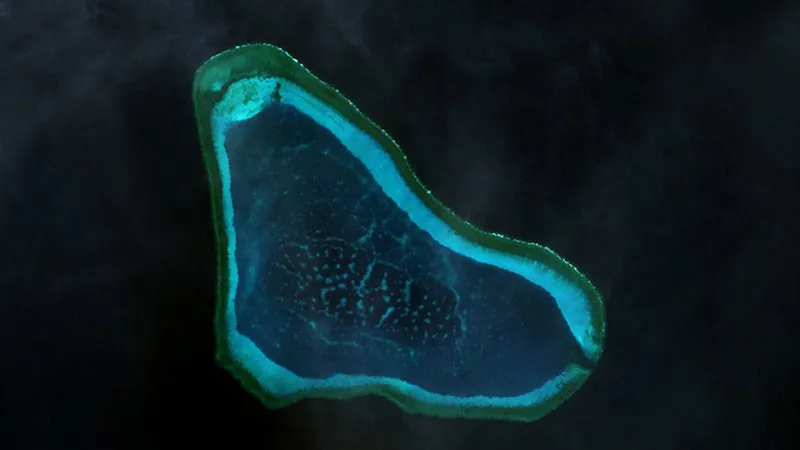-
CENTRES
Progammes & Centres
Location

Is China about to reclaim the Scarborough Shoal? It is a question that has absorbed discussions in maritime circles recently. Speculation is growing that China might be planning to build a small permanent structure on Scarborough, located close to the Philippines' coast, in which to base Chinese military personnel — a contingency that might result in a sharp escalation of regional tensions.
The genesis of this conjecture is a recent report in the South China Morning Post quoting "a source familiar with the matter" stating that Beijing was waiting for the completion of the G20 summit next month to start dredging the strategically-placed shoal, which is located close to key sea-lanes in the South China Sea. While China is refraining from any moves that might jeopardise discussions during the G20 summit (where the focus is likely to be on 'regional peace') Beijing is said to be working on a plan to begin reclamation work before the start of the US presidential election in November.
For Beijing, converting the shoal into an artificial island is a good way of emphasising its dominance over the Southeast Asian littorals. In the month since the UN arbitral tribunal gave its verdict rejecting Beijing’s historic rights within the nine-dash line, China’s military has assiduously built up its military presence in the South China Sea. An increased presence of warships and aircraft in the contested littorals has been complemented with efforts to fortify military structures on the islands. These include refurbished missile sites and reinforced hangers for military aircraft.
China’s moves have triggered regional alarm with the US increasing its own naval presence in the region. Vietnam has rushed to position surface-to-air missiles on islands it controls in the South China Sea, and Indonesia and Malaysia have vowed to redouble their efforts to apprehend Chinese fishing boats in their waters.
Why, however, are the US and its Southeast Asian allies treating Scarborough like a sacred 'red-line'?
The answer is simple. Control over this well-located shoal confers on China a vital strategic edge, radically altering the balance of power in the Asia-Pacific. Scarborough’s proximity to the coast of the Philippines makes it a significant factor in US naval plans, not least since Manila has a mutual defence treaty with Washington. What’s threatening, however, isn’t just the prospect of Chinese radars and missiles at Scarborough. Analysts say China may be aiming to set-up a naval support facility, enabling the establishment of a 'strategic triangle' in the South China Sea that would help enforce a Chinese Air Defence Identification Zone and expand China’s control over these vital waterways. Reports suggest China’s plan to militarise Scarborough is to create the 'third vertex of a triangle of military bases', which would render Chinese threats to the main Philippine island of Luzon more credible.
US Pacific Fleet intelligence also indicates that, in combination with China’s seven new islands in the Spratly group, a new naval facility at Scarborough will provide Beijing with the ability to effectively control access to the waters of the South China Sea. The PLA Navy, reports suggest, has been exercising to "prepare for a sudden, cruel and short modern war" in the South China Sea. That China’s new islands in the South China Sea, also the site of the PLA’s newly instituted Combat Air Patrols, are located in its southern part, has led some to conclude Beijing is planning on reclaiming Scarborough.
The Chinese tactic, apparently, is to swarm the South China Sea’s critical littorals and airspace with law-enforcement vessels, fishing boats, and military aircraft in an attempt to demonstrate defiance of the UN tribunal court’s verdict. Beijing believes an effective demonstration of military strength would both deter foreign warships from venturing too close to Chinese-controlled waters, as well as signal clearly that China will not be shackled by what it sees as the unlawful outcomes of a bogus arbitration procedure.
It is not surprising then that the number of Chinese maritime security vessels near Scarborough shoal has risen sharply over the past several weeks. Unlike previously, when China has had only two or three naval or coast guard vessels deployed near the shoal, the number of Chinese law enforcement and combat ships has now increased to more than a dozen. In addition, Beijing has been routinely positioning large flotilla of hundreds of fishing vessels around Scarborough Shoal in an action similar to that occurring in the East China Sea. Last week, China sent seven coast guard vessels and over 200 fishing vessels to the waters around Japan’s Senkaku Islands. The incursion drew howls of protest from Tokyo, but a nonchalant Beijing brushed the objections aside saying the boats were operating in Chinese waters.
The Chinese strategy, apparently, is to make a play for all of East Asia’s contested littorals thereby preventing opponents from combining ranks in the South China Sea. The idea is to keep rival forces off-balance in the South China Sea by undertaking distracting manoeuvres in contiguous theatres such as the East China Sea, even as the Chinese military raises the stakes in their primary theatre of interest. While Beijing is unwilling to get into a full-scale confrontation it hopes to convince adversaries that, if pushed hard in the South China Sea, the Chinese military is prepared to initiate hostilities anywhere.
In light of China’s brinkmanship the US has been forced to adopt a cautious approach. While American policymakers are yet to come to terms with their country's reduced leverage in the Asia-Pacific, Washington is cognisant of the threat that China’s modernising military presents to peace in the region. Even so, the US has had to contend with mixed messaging from its Southeast Asian allies — particularly the Philippines, where President Rodrigo Duterte’s overly conciliatory tone with Beijing has perplexed many regional watchers. Indeed, Duterte’s decision to send one of his predecessors, Fidel Ramos, to hold exploratory talks with the Chinese has caused dismay in Washington. The US believes Manila has been too eager to compromise, willing even to concede to Beijing advantages conferred to it by the Arbitral Tribunal.
This does not mean China hasn’t given a thought to the costs involved. Despite dominating the narrative in recent times, Beijing realises that an open show of force would be severely detrimental to its interests. Despite its control of major features and islands in the South China Sea, Beijing knows a combined counter-action by the US and its partners in the Asia-Pacific might result in an uncontrollable spiral of violence. In the circumstances, all China must do is to find a way in which its maritime agencies can quietly and efficiently mark its presence in the vital sea spaces while ensuring that Chinese geopolitical interests are not compromised. For many, the key to resolving the South China Sea impasse lies in initiating a dialogue between Washington and Beijing. President Xi has long called for a special relationship between China and the United States that would allow both countries to better manage the conflict. Notwithstanding China’s economic interests in Southeast Asia, however, many in Washington are convinced that China will build military facilities that allow its naval and law enforcement ships to bully and intimidate its neighbours. Should China succeed in reclaiming Scarborough Shoal it will be the most significant escalation so far in the tussle for the South China Sea.
Oddly then, reclaiming Scarborough might be Beijing’s undoing, because it might provide the spark needed to instigate China’s tactical containment in the South China Sea.
This commentary originally appeared in Policy Forum.
The views expressed above belong to the author(s). ORF research and analyses now available on Telegram! Click here to access our curated content — blogs, longforms and interviews.

A former naval officer Abhijit Singh Visiting Fellow at ORF. A maritime professional with specialist and command experience in front-line Indian naval ships he has been ...
Read More +